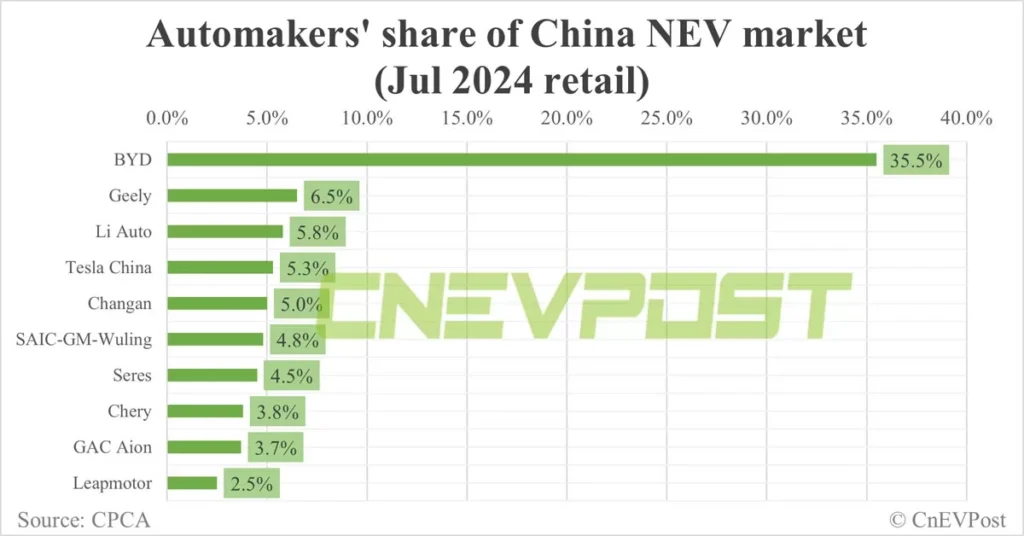In the January-July period, BYD was No. 1 in the NEV market by retail with a 34.1 percent share, while Tesla was No. 3 with a 6.5 percent share.

BYD (HKG: 1211, OTCMKTS: BYDDY) still had the largest share of China’s new energy vehicle (NEV) market last month, while Tesla (NASDAQ: TSLA) fell one spot in the rankings as its share slipped.
BYD saw retail sales of 311,804 passenger NEVs in China in July, continuing its No. 1 position with a 35.5 percent share, according to data released today by the China Passenger Car Association (CPCA).
The company is the only one with more than a 30 percent share of China’s NEV market, and its share in July was higher than the 32.7 percent in June.
BYD’s retail sales in July were up 35 percent from 230,882 in the same month last year, according to the CPCA.
BYD released figures earlier this month showing it sold 342,383 NEVs in July, up 30.6 percent year-on-year and up 0.21 percent from June. The figure is for wholesale sales and includes both passenger cars and commercial vehicles.
China passenger NEV retail sales in July were 878,000 units, up 36.9 percent from a year ago and up 2.8 percent from June, CPCA data released yesterday showed.
Tesla’s retail sales in China in July were 46,227 vehicles, up 47.1 percent from a year ago, but its share fell to 5.3 percent from 6.9 percent in June.
Tesla now sits in fourth place in the CPCA’s monthly NEV retail sales ranking, having lost its third spot in the June ranking to Li Auto (NASDAQ: LI), which was fifth in the last ranking.

In China, NEVs include battery electric vehicles (BEVs), plug-in hybrid electric vehicles (PHEVs), and fuel-cell vehicles. BYD and Li Auto both make PHEVs and BEVs, while Tesla only makes BEVs.
Tesla China sold 74,117 vehicles in July, including 27,890 exported and 46,227 sold in China, according to data compiled by CnEVPost.
Tesla has a factory in Shanghai that produces the Model 3sedan and Model Y crossover, both for deliveries to local customers and as an export hub for it.
Tesla’s pattern is to produce cars for export in the first half of the quarter and for the local market in the second half, it previously said.
Geely saw retail sales of 57,223 NEVs in July, up 62.8 percent year-on-year, and continued to rank second with a 6.5 percent share, down from 7.4 percent in June.
In the January-July period, BYD’s NEV retail sales in China were 1,700,262 units, up 22.7 percent year-on-year, to take first place with a 34.1 percent share.

Geely’s NEV retail sales for the period were 363,532 units, up 107.1 percent year-on-year, to take second place with a 7.3 percent share.
Tesla’s retail sales in China in the January-July period were 324,544 units, down 0.3 percent year-on-year, and third with a 6.5 percent share.
In the passenger car market that includes traditional fuel vehicles, BYD topped the retail ranking with an 18.1 percent share in July.

Geely was second with a 6.9 percent share in July with retail sales of 118,400 units, up 3.8 percent year-on-year.
FAW-Volkswagen was third in the retail ranking with a 6.6 percent share in July with retail sales of 114,234 units, down 22.6 percent year-on-year.
Li Auto was No. 10 in the July retail ranking that includes all passenger cars, its first time on the list.
In the January-July period, BYD ranked No. 1 in China’s passenger car retail market share with 14.7 percent, FAW-Volkswagen was No. 2 with 7.7 percent and Geely was No. 3 with 7.6 percent.

China NEV retail rises to 878,000 in Jul, penetration exceeds 50% for 1st time
Become A CnEVPost Member
Become a member of CnEVPost for an ad-free reading experience and support us in producing more quality content.
Already a member? Sign in here.

